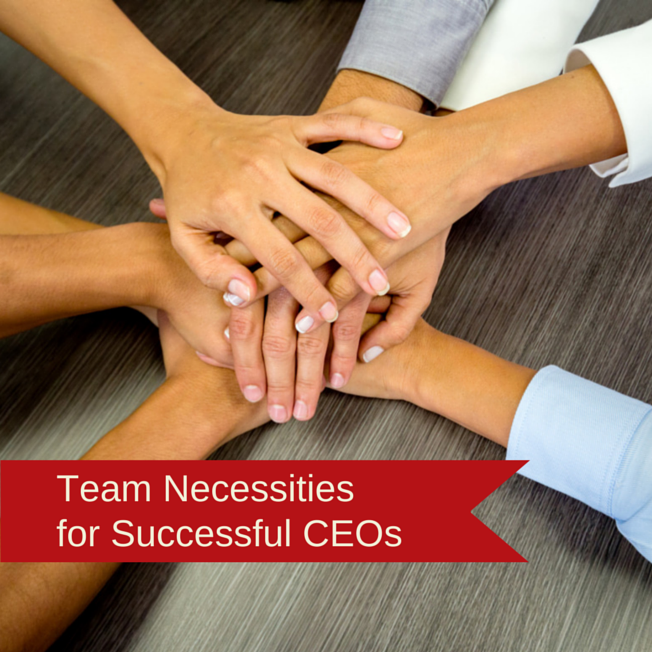Team Necessities for Successful SMB CEOs
by Hesam Lamei
Chief Executive Officers face numerous challenges every day, far too many for any single person to conquer on his or her own. Supportive teams surround successful CEOs, and at small-to-medium businesses, a supportive team is especially important. At smaller companies, leaders face unique challenges. They have more direct exposure to employees, and every employee counts as a critical contributor that impacts revenue. Decisions at SMBs are crucial as they have company-wide effects and often significant influence on revenue or overhead costs. CEOs at small and mid-size businesses lean on their teams to ensure leadership makes optimal decisions. They must be able to delegate important endeavors to their team and trust the outcomes will coincide with the vision of the company. Because of this key role, I believe there are imperative attributes CEOs at SMBs need from their executive team.

Let the Debate Begin
Healthy debate is helpful for any organization. Different perspectives reveal multiple ways of looking at a situation and can greatly contribute to finding the best solution for your business. Over the years, I continue to see how important it is to be open to other perspectives. When a difficult situation is at hand, I ensure my team debates all angles before moving forward.
At Aventis Systems, one of our departments was experiencing a continual trend of declining performances, high turnover, and low morale. My team debated for more than a year and subsequently concluded a senior management hire would be the ideal solution to bridge the gap between department and individual management needs. We moved forward with the hire only when the team arrived at a decision unanimously.
Courageous Risk-Taking
Possessing the knowledge and willingness to take calculated risks is vital to business growth. With a strenuous focus on growth, CEOs at smaller businesses depend on the leadership team to proactively identify potential opportunities and analyze any associated costs or risks for the company. As the team pursues opportunities, it is equally important they oversee each to the finish. Remember to acknowledge that mistakes, and at times failures, are part of taking risks. If you learn from each situation and move on with the valuable experience, a failure can become a positive characteristic for the business.
Throughout our history of growth at Aventis Systems, we have taken a number of risks to expand our offerings. Two areas of note include expanding our marketing and sales of refurbished products to the Federal Government and adding third-party nationwide maintenance services to our portfolio. After my team presented enough research and marketing data, I decided we were ready to pursue the Federal Government vertical. Additionally, when we found the right partner for on-site services, I felt comfortable moving forward. Both areas have allowed us to grow dynamically as we continue to develop our business, such as recently enhancing our services portfolio with Advanced IT Services.
Honesty is the Best Business Policy
Having integrity in business interactions instills professional honesty. Echoing the need for an open mind to debate solutions, CEOs at small and mid-size businesses should continually ask their team if leadership should be taking different approaches and expect honest feedback. Honesty is a vital ingredient for the executive team because even CEOs need to be told when they are off base. Honesty drives better decision-making, and leadership should be willing to play devil's advocate to build a platform for sincere discourse.
Honesty among my team members allows us to make intelligent decisions so Aventis Systems can continue to progress. When it comes to the performance of company channels, I look to my team for continual, honest discourse to ensure optimal decisions are made. At times, I may not agree with my key stakeholders about current standings or future predictions of our eCommerce or direct sales channels, but it has been critical that my team communicates potential risks to achieving our goals so we can work together to decide how to handle these barriers.
There is No "I" in Team
A true team-player understands what it means to put the team before the individual. It is important for the CEO's team to lead from a selfless, function-specific vantage point rather than protecting individual self-interests. Selflessness goes beyond point-of-view. In the professional world an elevated work ethic, immense dedication, and conscientiousness are all key characteristics to being a team player. A prime example of selflessness is when leadership remains dedicated to decisions for the business and understands those decisions affect their individual departments.
The first few start-up years at Aventis Systems required very selfless behavior from my team in terms of their time commitment and personal schedules as they regularly worked 70 to 90 hour weeks. My team continues to make sacrifices to support our company revenue at all costs, understanding that when one department receives accolades, all departments must thrive together for the business to be successful.
Trust in Each Other
Transparency is a precursor to trust, and trust is one of the most important elements of the CEO's team. Being completely transparent will aid understanding among departments and lead to feelings of security within the leadership team. The CEO needs to be able to trust the team is committed to supporting the company's vision, strategy, culture, and executed decisions.
I occasionally arrive at decisions that not all departments are in agreement with, such as in the recruitment and retainment of employees, but I need to trust all decisions are respected and confirmed by my team so the message will be delivered to their respective departments appropriately. Being able to trust my team's communication fosters cohesion throughout the organization and allows productivity to increase as departments deliver on completed decisions.
CEOs are on a pathway to success when their supportive teams ensure debate, calculated risk-taking, honesty, selflessness, and trust are ever-present. I always remind my team, "make the team work to make the dream work."